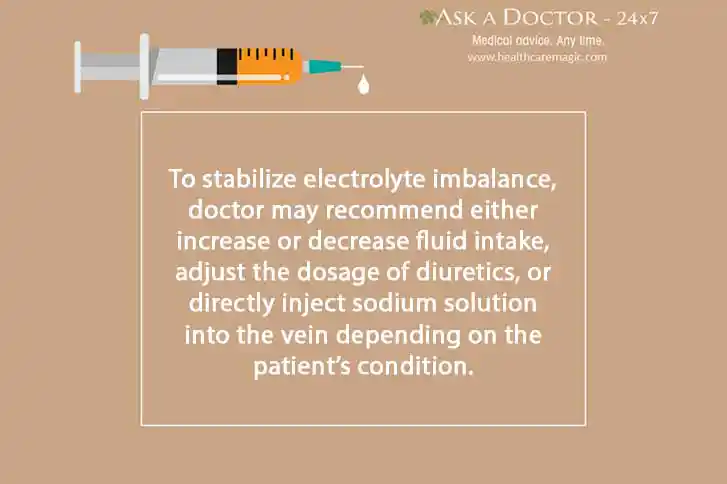Diagnosed With Low Sodium In The Blood? Here's What You Need To Know!
Sodium chloride or what we call ŌĆśtable saltŌĆÖ makes up 0.4 percent of the human body-weight. While most of medical science has focused on sodium being one of the leading causes of high blood pressure and heart issues, low sodium levels or hyponatremia can also lead to a host of health issues.
Ironically, sodium plays an essential role in not only stabilizing water levels both in and around your cells but also stabilizes blood pressure levels! Without adequate sodium, your body could face a whole host of muscle and nerve related issues. From cirrhosis to AddisonŌĆÖs disease, maintaining adequate salt levels in your body is vital in keeping health issues at bay. Considering the huge role that sodium plays in ensuring your body functions at optimal levels, it is vital that one's sodium levels are never too low.
Let us look into the many different ways in which we can fight away the sodium deficiency.
Factors that can increase your risks of developing sodium deficiency

Here are some of the known factors:
- Old Age: The older you get, the harder it is for your body to maintain sodium levels. In addition to that, since most elderly people take medications or suffer from some form of disease, the chances of developing hyponatremia are higher.
- Diuretics: While diuretics do release more sodium into the body, it also causes the body to lose more water and as a result can lead to dehydration in the long-run. Both natural diuretics and medication-based diuretics can cause dehydration and therefore, hyponatremia.
- Physically-active/Lifestyle: Whether you are training, on a track, at a workout session or simply slogging it out at work, you tend to lose a lot of water which can cause low sodium levels. Therefore, it is best to keep oneself hydrated.
- Climatic conditions: Countries and states with warm climates can lead to increased sweating and therefore decrease sodium levels, if not adequately hydrated.
- Low-sodium diet: A diet low on sodium can also lead to electrolyte imbalance in the long-run.
Besides the above ones, certain diseases may also increase oneŌĆÖs risk of developing hyponatremia. Kidney failure, heart issues, liver diseases etc., can cause your sodium levels to dip and therefore must be treated at the earliest.
What To Do If Sodium Level Dips Down?

There are some obvious tell-tale signs of low-sodium levels. If you feel persistent sense of low energy, severe headache that keep reoccurring, sudden episodes of muscle spasms, unable to eat, drink or swallow anything without the tendency of vomiting, or you are experiencing constant sense of confusion, being unable to think or focus, them might be your bodyŌĆÖs has insufficient sodium.
If two or more of these symptoms occur at the same time, it is the time to modify your lifestyle and visit an Internal Medicine specialist to seek immediate attention.
If two or more of these symptoms occur at the same time, it is the time to modify your lifestyle and visit an Internal Medicine specialist to seek immediate attention.
Simple Lifestyle Modifications That Helps to Balance BodyŌĆÖs Sodium Level

Follow these four simple steps to bring back sodium balance in the blood:
- Decrease or increase in fluid Intake: Depending on your bodyŌĆÖs water levels, whether dehydrated or over-hydrated, doctors will request you to cut-back or increase fluid intake.
- Adjust dosage of diuretics: If you are on any diuretic-based medications, doctors might either adjust the dosage of diuretics or replace it with other appropriate medications to stabilize sodium levels.
- Stabilize bodyŌĆÖs electrolyte level: In order to stabilize electrolyte levels, doctors might deliver sodium solutions directly into the vein, via drips or IV therapy.
- Observe for underlying diseases or lifestyle habits: The root cause of any issue should be investigated in order to completely restore oneŌĆÖs health. If other health issues, underlying diseases or lifestyle habits are leading to an electrolyte imbalance, then doctors will look into them and might request you to make necessary changes to root out the problem.
Medication-wise

Since low sodium levels can cause a wide-array of painful and uncomfortable symptoms, doctors will prescribe medication to treat these symptoms apart from stabilizing electrolyte imbalance. Remember, delay of any kind could lead to further health complications or even coma and death in severe cases!
While science might warn us about impending cardiac issues that are a result of high salt content, completely cutting out salt in your diet is just NOT the solution. Whether it be in our daily salt-intake or otherwise, too much or too little of it in your diet will only lead to further health complications.
For more information on role of sodium in our body function you can consult an Internal Medicine specialist online.
Ask a Specialist
Recent Questions


